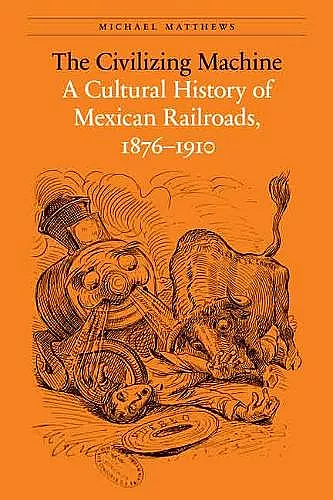The Civilizing Machine
A Cultural History of Mexican Railroads, 1876-1910
Format:Paperback
Publisher:University of Nebraska Press
Published:1st Jan '14
Currently unavailable, and unfortunately no date known when it will be back

Explores the ideological and cultural milieu that shaped the Mexican people's understanding of technology.
In late nineteenth-century Mexico the Mexican populace was fascinated with the country’s booming railroad network. Newspapers and periodicals were filled with art, poetry, literature, and social commentaries exploring the symbolic power of the railroad. As a symbol of economic, political, and industrial modernization, the locomotive served to demarcate a nation’s status in the world. However, the dangers of locomotive travel, complicated by the fact that Mexico’s railroads were foreign owned and operated, meant that the railroad could also symbolize disorder, death, and foreign domination.
In The Civilizing Machine Michael Matthews explores the ideological and cultural milieu that shaped the Mexican people’s understanding of technology. Intrinsically tied to the Porfiriato, the thirty-five-year dictatorship of Gen. Porfirio Díaz, the booming railroad network represented material progress in a country seeking its place in the modern world. Matthews discloses how the railroad’s development represented the crowning achievement of the regime and the material incarnation of its mantra, “order and progress.” The Porfirian administration evoked the railroad in legitimizing and justifying its own reign, while political opponents employed the same rhetorical themes embodied by the railroads to challenge the manner in which that regime achieved economic development and modernization. As Matthews illustrates, the multiple symbols of the locomotive reflected deepening social divisions and foreshadowed the conflicts that eventually brought about the Mexican Revolution.
"This is an original and valuable study that deepens our understanding of Porfirian modernity."-Robert F. Alegre, American Historical Review -- Robert F. Alegre American Historical Review "Matthews's work makes a solid contribution to the growing literature on the Porfiriato."-William Schell, Jr., Americas -- William Schell, Jr. Americas "Matthews supplies overwhelming evidence to show how the railroad engine became a cultural lightning rod. It is difficult to think of a contemporary corollary with such cultural significance, which only underscores the value of this book to understanding the late nineteenth century in Mexico."-Andrew Offenburger, Western Historical Quarterly -- Andrew Offenburger Western Historical Quarterly "This is a fine contribution to the scholarship of nineteenth century Mexico. Very well researched and extremely engaging, the book analyses the significance of railways in the consciousness and outputs of different social groups in Mexico during the three and a half decades of the Porfiriato."-Samantha McDermott, Journal of Transport History -- Samantha McDermott Journal of Transport History "Matthews's insistence on the value of the visual as well as the written and his fluency with many media make for an enjoyable and accessible read."-Casey Lurtz, Hispanic American Historical Review -- Casey Lurtz Hispanic American Historical Review "The first cultural study of railroads in Mexico. Matthews's study is timely ... with lively accounts and interesting analysis."-James A. Garza, associate professor of history and ethnic studies, University of Nebraska-Lincoln -- James A. Garza
ISBN: 9780803243804
Dimensions: unknown
Weight: unknown
340 pages